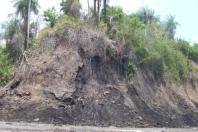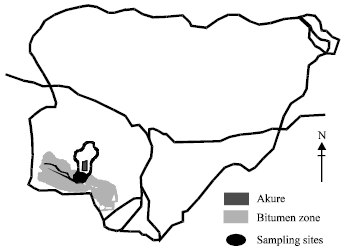Nigeria
The plot:
The country that has an oil-producing region ominously nicknamed "the most polluted place on earth" also has a separate tar sands region, possibly facilitating the most destructive. Several countries and companies have indicated interest in possible tar sands developments in Nigeria over decades. Recently the Abuja government has set out blocks for bidding in tar sands areas.
Nigeria and corporations operating on Nigerian territory are already implicated as culprits of human rights violations as a result of oil and gas development. With tar sands developments on long stretches of coastline this holds the possibility of increase. Nigeria could also set a bar for continent-wide destructive practices towards the environment when it comes to newer forms of extreme extraction.
The details:
One major bitumen belt of many tar sands deposits, in the southwest of the country along 120km's of coastline.
Total size of the deposits are over 30 bn bbl in-place, estimates of 3 to 3.5 bn bbl recoverable; proved reserves currently 1.1 bn bbl of synthetic oil.
Starting in the early 20th Century, experiments and exploration have been repeatedly carried out on Nigerian tar sands. Currently government open to bids for up to 3 tar sands blocks for development. As of 2007 a legal investment framework has been established to entice foreign investment in tar sands. Throughout the 2000 decade, Conoco Energy Nigeria operated exploration and assessment of Nigerian tar sands.
Sinopec of China apparently owner of permit for Block “B” of Nigerian tar sands.
Due to shallowness of the deposit, majority of Nigerian tar sands would use open cast strip mining techniques based on Canadian technology. Geological studies have shown higher oil yield per unit in Nigeria over that of the Athabasca tar sands.
Although mining technology has been identified as likely development requirement, estimates of bpd development have not been made public.
Nigeria has been known for dangerous and corrupt oil practices and developments for decades. In the regions to the East of the tar sands deposits, in the Niger Delta, off shore oil developments have threatened air and water quality, poisoned animals and caused tremendous illnesses among local indigenous populations in Ogoniland. Royal Dutch Shell (who hold the largest asset reserves of bitumen on the planet among energy companies) has been implicated and sued for direct human rights violations against populations that have been resisting flaring and oil developments from Shell (and other energy companies) on their lands in the Delta. Resistance in the Delta has taken on a variety of peaceful and militant shapes.
Different indigenous communities exist in the tar sands regions of Nigeria, but the likelihood of the population trusting oil companies is virtually nil. The landscape destroying mega mining projects of tar sands in Alberta, Canada are openly touted by development experts as a model for Nigeria.
Nigeria, as the largest country in Africa, can often set a standard for the continent on many development issues. Were Nigeria to employ tar sands mining it would be all the more difficult to prevent in Congo-Brazzaville, the DR Congo, Madagascar, Angola and elsewhere. A bidding process in 2009 that saw interest from multiple energy corporations in several countries (US, Canada, South Africa and China were identified by Friends of the Earth International) apparently went incomplete after political crises erupted elsewhere in the country. Three large blocks have been set up by the Ministry of Mines, with block “B” apparently now owned by Sinopec of China, but for what and when is unclear, in the tradition of Nigerian oil industry accountability and transparency.



